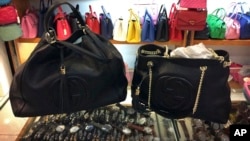The Bank of China is appealing a decision by a New York court to fine it $50,000 a day for withholding information about counterfeiters' bank accounts in China.
The appeal, filed Tuesday, is the latest twist in a five-year legal saga that pits one of China's largest state banks against Western luxury brands seeking new, more powerful tools to fight rampant counterfeiting. Bank of China says it is fighting to maintain client privacy as a matter of national sovereignty.
Gucci, along with other Kering Group brands, is seeking $12 million from the bank to cover damages inflicted by a counterfeiting ring it says sold fake handbags and wallets to U.S. consumers. Using records provided by JPMorganChase, Gucci traced $530,000 in transfers from U.S.-based counterfeiters to Bank of China accounts in China.
The Bank of China has repeatedly refused to provide information about those accounts or freeze the counterfeiters' funds for Gucci. Instead it secretly froze over $890,000 of the accused counterfeiters' money to cover its own legal costs in the fight with Gucci, Chinese court documents show.
The case highlights the incompatibility between the Chinese and U.S. legal systems and could have far-reaching implications for the ability of U.S. courts to extract information from Chinese banks operating in America. That legal firewall has helped Chinese banks serve as safe havens for counterfeiters, who use them to process credit card payments for fakes, often sold online, and move their money around the globe.
The Bank of China, and other Chinese banks embroiled in similar litigation in the U.S., argue that complying with U.S. court orders to disclose client information would violate Chinese bank secrecy laws and subject them to civil and criminal penalties in China. They have so far failed to provide undisputed evidence that those penalties are, in practice, significant.
Gucci could have obtained information about the counterfeiters' accounts in Chinese court or through the Hague convention, said Bank of China lawyer Jane Jiang, a partner at Allen & Overy in Beijing. The Hague convention allows for government-mediated evidence sharing, but critics say China does not comply with such requests in a timely or consistent manner.
“The bank is especially concerned by the court's actions given that other countries disallow disclosure of bank account information to a foreign government without permission from the domestic authorities of the bank's home country, particularly when other international legal channels exist to obtain such documents,” Jiang said in an email.
On Sept. 29, New York District Court Judge Richard Sullivan ruled that the U.S. has jurisdiction over the Bank of China, which has four U.S. branches. He ordered the Bank of China to comply with subpoenas for documents related to the accused counterfeiters' bank accounts, even though the accounts are in China. The bank refused, and Sullivan said if the bank did not provide the records by Dec. 7, he would begin imposing a $50,000-a-day contempt fine.
The court “will not tolerate any further attempt by BOC to delay these proceedings and thwart Plaintiff's efforts to access account information that is essential to the prosecution of Plaintiffs' claims against rampant counterfeiters who have consciously used BOC to facilitate their illegal schemes,” Sullivan wrote in a Nov. 30 order.
Bank of China USA's chief executive, Xu Chen, told state-run Xinhua news, in an interview published Wednesday, that the case has wide-ranging implications which could discourage Chinese investment in the U.S.
“Many Chinese investors believe the United States has an open and fair legal system, which is a key factor in good business environments,” Xu told Xinhua. “Now they might start to worry that they could also get caught in a legal dilemma because of the `unlimited jurisdiction' sought by some U.S. courts.”
Kering Group declined to comment.
